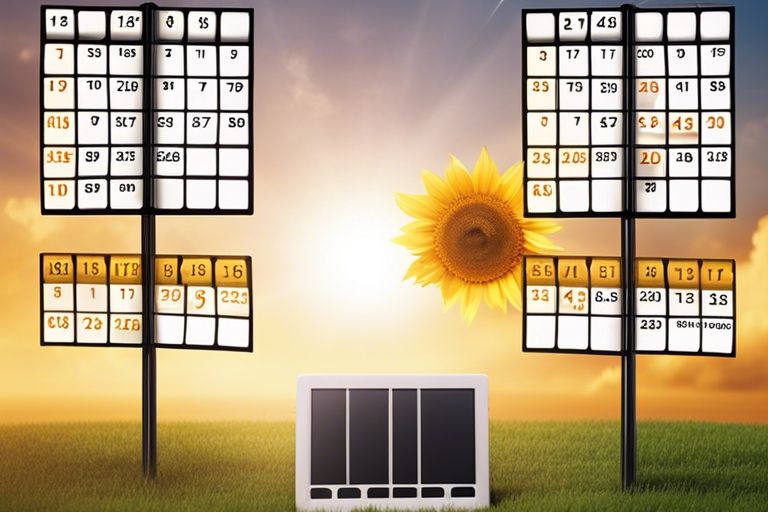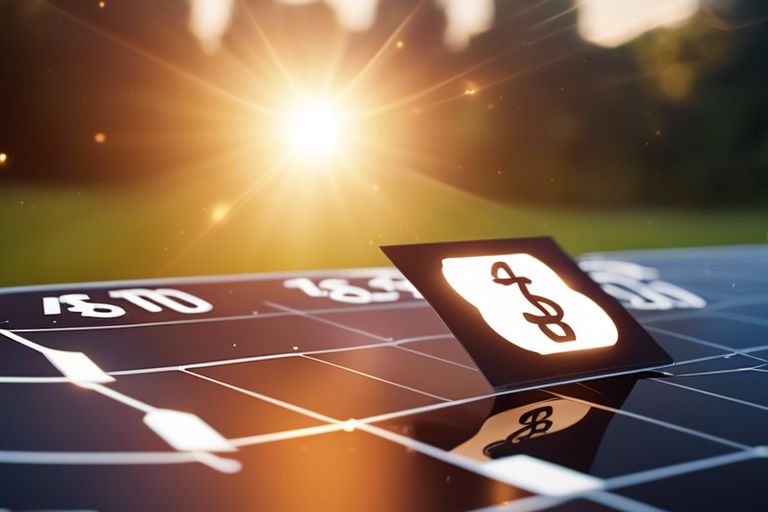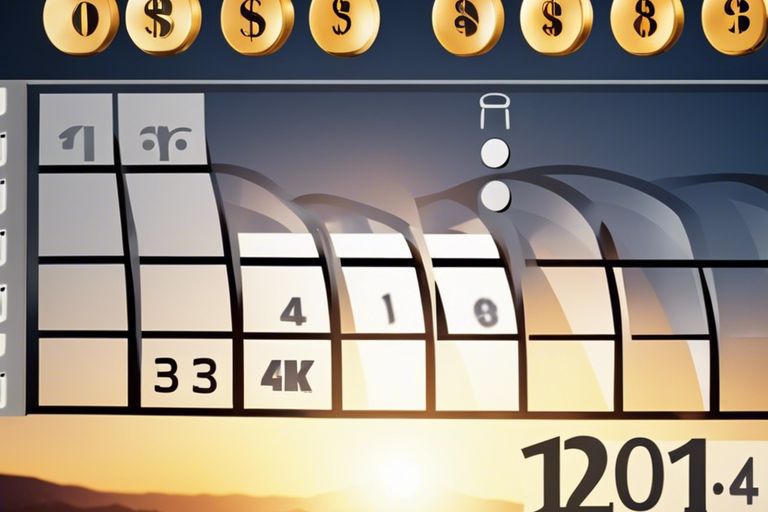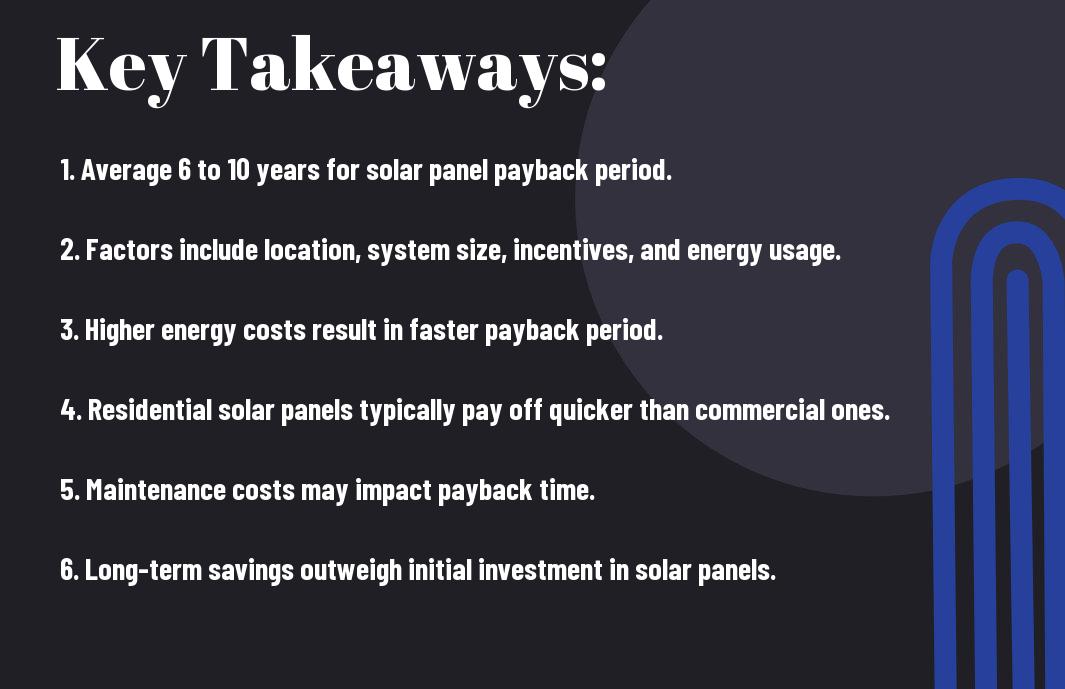Most people considering investing in solar panels wonder, “How many years does it take for solar panels to pay off?” This question is crucial when making the decision to switch to solar energy. In this blog post, you will discover the factors that influence the payback period of solar panels, allowing you to make an informed decision about this eco-friendly and cost-effective investment for your home.
Key Takeaways:
- Location and energy usage: The payback period for solar panels can vary based on the location and amount of electricity consumed by a household.
- Government incentives and rebates: Taking advantage of available government incentives and rebates can significantly shorten the time it takes for solar panels to pay off.
- Installation costs: The initial cost of purchasing and installing solar panels can affect the time it takes for them to pay for themselves.
- Energy production: The efficiency of solar panels and the amount of electricity they generate play a key role in determining how long it will take for them to pay off.
- Long-term savings: While the payback period for solar panels may vary, they can provide significant long-term savings on electricity bills once they have paid for themselves.
The Cost of Solar Panels
Initial Investment
At the outset, investing in solar panels can seem significant. The initial cost includes purchasing the panels, inverters, mounting equipment, and installation. However, as you probe deeper into the long-term benefits, you’ll realize it’s a smart financial move. The initial setup costs will vary based on factors such as the size of your home, your energy needs, and location.
Ongoing Expenses
To maintain and get the most out of your solar panels, you might incur some ongoing expenses. These can include routine maintenance checks, inverter replacements, and monitoring software costs. However, these expenses are relatively low compared to the savings you will reap in the long run from reduced electricity bills and potential incentives.
Plus, when you consider the rising costs of traditional energy sources, investing in solar panels now can shield you from future price hikes and provide you with a stable energy source for years to come.
The Benefits of Solar Panels
Electricity Savings
One of the significant benefits of installing solar panels is the potential for electricity savings. By harnessing the power of the sun, you can generate your electricity, reducing your reliance on traditional energy sources and lowering your monthly utility bills. Over time, the savings from generating your electricity can help offset the initial cost of installing solar panels.
Government Incentives
To further incentivize the adoption of solar energy, many governments offer incentives to homeowners who install solar panels. These incentives can come in the form of tax credits, rebates, or performance-based incentives. By taking advantage of these programs, you can reduce the upfront cost of installing solar panels and accelerate the payoff period.
A common government incentive is the Federal Investment Tax Credit (ITC), which allows you to deduct a percentage of the cost of installing a solar energy system from your federal taxes. This tax credit can significantly reduce the overall cost of going solar, making it a more accessible and cost-effective option for many homeowners.
Increased Property Value
On top of electricity savings and government incentives, installing solar panels can also lead to an increase in your property value. Homes equipped with solar panels are often more attractive to potential buyers due to the long-term cost savings they offer. Additionally, studies have shown that properties with solar panels tend to sell faster and at a premium compared to homes without solar energy systems.
Government studies have indicated that installing solar panels can increase the resale value of your home by up to 4.1% on average. This means that not only do you benefit from lower electricity bills and government incentives, but you also stand to make a profit when selling your solar-equipped home in the future.
Calculating the Payoff Period
Factors Affecting Payoff Time
All factors considered, the payoff time for solar panels can vary. Your location, energy usage, system size, cost of installation, and local solar incentives all play a role in determining how long it takes for your solar panels to pay off. The amount of sunlight your region receives will also affect the efficiency of your panels and how quickly you can recoup your initial investment. This means that understanding these factors is crucial in estimating the payoff period for your solar panel system.
Simple Payback Period Formula
Affecting the payback period of solar panels is a simple formula used to calculate how long it will take to recover your initial investment. This formula takes into account the total cost of your solar panel system, any incentives or rebates you may receive, your electricity savings per year, and the future electricity price increases. By plugging in these values, you can estimate the simple payback period for your specific situation.
Payback periods typically range from 5 to 20 years, with most systems paying for themselves within 10 years. Factors such as local electricity rates and available incentives can significantly impact the payback period — the higher the electricity rates and the more incentives you receive, the quicker your system will pay for itself.
Example Calculations
Periodically reassessing your system’s payoff period as energy costs and technologies evolve is advisable. By doing so, you can ensure your solar panel investment remains financially beneficial. Let’s assume your solar panel system costs $15,000 upfront, you save $1,500 per year on electricity costs, and the local electricity rates increase by 3% annually. Using the simple payback formula, you can calculate that your system will pay for itself in approximately 10 years.
Simple payback period calculations give you a clear idea of when your initial investment in solar panels will be recouped. By understanding and calculating the factors that influence this timeframe, you can make an informed decision about whether solar panels are a cost-effective choice for you.
Average Payoff Periods
Once again, if you are wondering about the average time it takes for solar panels to pay off their initial cost, you can find detailed information in the article “What Is the Average Payback Period for Solar Panels?“.
Residential Solar Panels
The average payoff period for residential solar panels typically ranges between 6 to 10 years. Factors such as your location, the size of your solar panel system, local electricity rates, and available incentives can influence this timeframe. With advancements in technology and decreasing installation costs, many homeowners are seeing a quicker return on their solar investment.
Commercial Solar Panels
Periods for commercial solar panels vary but generally fall between 4 to 8 years. Commercial entities often have larger roofs or land available for solar installations, which can accommodate bigger systems, resulting in more significant savings on electricity bills. Additionally, tax incentives and other financial perks can further shorten the payoff period for businesses investing in solar energy.
Average payoff periods for commercial solar panels tend to be shorter than residential ones due to the scale of the installations and the potential for higher energy production. Businesses can benefit from decreased operating costs and a positive environmental impact sooner by investing in solar energy systems.
Variations by Location
Average payoff periods can vary depending on your location. States with abundant sunlight and supportive solar policies may see shorter payback periods, sometimes as low as 4 years. Conversely, regions with lower sunlight exposure or fewer incentives may experience slightly longer payback periods, possibly up to 12 years. Factors like local electricity rates and weather patterns also play a role in determining how quickly you can recoup your solar investment.
Panels positioned in optimal locations, such as areas with ample sunlight and favorable incentives, will likely pay off faster than those in less ideal settings. It’s imperative to consider these location-based variations when deciding to invest in solar energy.
Factors Influencing Payoff Time
Now, let’s probe into the various factors that can influence how long it takes for your solar panels to pay off their initial cost.
System Size and Efficiency
On your journey to figuring out the payoff time for your solar panels, consider the size and efficiency of the system you are installing. A larger, more efficient system will generate more electricity, potentially allowing you to recoup your investment more quickly. Additionally, technological advancements in solar panels have made them more efficient in converting sunlight into electricity, further affecting the payoff time.
Local Electricity Rates
With local electricity rates playing a significant role in determining your payoff time, it’s crucial to assess how much you currently pay for electricity from the grid. If you live in an area with high electricity rates, your solar panels can potentially pay off faster since you are offsetting more expensive electricity with your solar-generated power. This means that the savings on your electricity bill will accumulate more rapidly, shortening the time it takes to reach the point where your solar panels have paid for themselves.
Payoff time can also be influenced by any maintenance and repair costs associated with your solar panel system.
Maintenance and Repair Costs
For your solar panels to pay off in the estimated time frame, it’s imperative to factor in potential maintenance and repair costs. While solar panels are durable and require minimal maintenance, unexpected issues can arise over the years. By budgeting for any maintenance or repair costs that may occur, you can ensure that your solar panels continue to generate savings and stay on track to pay off their initial cost within the expected timeframe.
Time is of the essence when it comes to calculating how long it will take for your solar panels to pay off, but by considering these key factors, you can make an informed decision that aligns with your financial goals and sustainability efforts.
Maximizing Your Return on Investment
Optimizing System Performance
To maximize the return on your solar panel investment, it’s crucial to optimize your system’s performance. This involves ensuring that your panels are positioned to receive the maximum amount of sunlight throughout the day. To do this, consider factors such as the angle of installation and potential shading from nearby trees or buildings. Regularly cleaning your panels can also improve their efficiency and overall performance, leading to greater energy production and a faster payback period.
Energy Storage and Grid Independence
Energy storage systems can further enhance the benefits of your solar panels by allowing you to store excess energy generated during the day for use during times when sunlight is not available. This can increase your overall energy independence and reduce reliance on the grid, potentially saving you even more money over time. By combining solar panels with energy storage, you can maximize your return on investment and enjoy a more sustainable energy solution for your home.
Investing in an energy storage system may require an additional upfront cost, but it can provide long-term financial benefits as well as peace of mind knowing that you have a reliable source of power, even during grid outages or peak demand periods.
Selling Excess Energy Back to the Grid
The option to sell excess energy back to the grid can provide another avenue for maximizing the return on your solar panel investment. By participating in net metering programs or feed-in tariffs offered by your utility company, you can earn credits or payments for the surplus energy your system produces. This can help offset your electricity costs and speed up the payback period for your solar panels.
The ability to sell excess energy back to the grid not only provides a financial benefit but also contributes to the broader goal of promoting renewable energy generation and reducing carbon emissions in your community.
Understanding Solar Incentives and Rebates
To wrap up
So, when considering how many years it takes for solar panels to pay off, keep in mind the various factors that can influence this timeline. Factors such as your location, energy consumption, available incentives, and the cost of installation all play a role in determining your payback period. By carefully weighing these factors and working with a reputable solar provider, you can make a well-informed decision that not only benefits the environment but also your wallet in the long run.
FAQ
Q: How many years does it take for solar panels to pay off?
A: The payback period for solar panels can vary depending on various factors such as the cost of the solar system, the amount of sunlight your location receives, local energy prices, available incentives, and your electricity usage. On average, most homeowners see a payback period of around 5 to 10 years.
Q: What factors can influence the payback period of solar panels?
A: Some of the key factors that can affect the payback period of solar panels include the cost of the solar system, the efficiency of the panels, the amount of sunlight your location receives, the local electricity prices, available incentives or rebates, and your energy consumption habits.
Q: How can I calculate the payback period for installing solar panels?
A: To calculate the payback period for solar panels, you can divide the total cost of the solar system installation by the annual savings on your electricity bill. This will give you the number of years it will take for the solar panels to pay for themselves. Keep in mind that this is a rough estimate, and the actual payback period may vary.
How much is a solar system for a 2000 sq ft house



